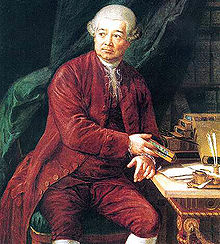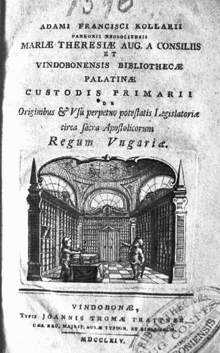Adam František Kollár
Adam František Kollár , German also Adam Franz Kollár (born April 17, 1718 in Terchová , Kingdom of Hungary , today Slovakia ; † July 10, 1783 in Vienna ) was a Slovak writer , historian and court librarian; he belonged to the lower nobility . Kollár was court advisor to Queen Maria Theresa . He is regarded as a personality of the Enlightenment and advocate of the absolute monarchy . In addition, the creation of the term ethnology and its definition is ascribed to him.
Name forms
- German and outdated English: Adam Franz Kollár
- Latin: Adamus Franciscus Kollarius
- Slovak and Czech: Adam František Kollár
- Hungarian: Kollár Ádám Ferenc
Life
Kollár was born into the family of a nobleman in Terchová, about 25 km east of Sillein . He attended a Jesuit school in Neusohl and later a grammar school in Schemnitz . He then studied at the University of Tyrnau (1734–36), where he also became a member of the Society of Jesus . 1748 completed his theology studies at the University of Vienna ; after receiving his doctorate, he left the Society of Jesus.
During his studies he dealt with numerous languages. In addition to Slovak, his mother tongue, Kollár also mastered German, Hungarian, French and Hebrew as well as classical (Latin, ancient Greek) and oriental (Turkish, Persian) languages.
While he was still a student, he began his career as a professor in Liptov-Sankt Nikolaus . After graduating, he became a scriptor in the Kuk court library in Vienna. Just one year later he was promoted to second curator, and in 1758 to the first curator of this library. From 1772 he was head of the court library; from 1774 until his death he was their chief librarian.
At the court of Maria Theresa he was court advisor and promoted an enlightened absolutism . With his works (e.g. De Originibus & Usu perpetuo potestatis Legislatoriae circa sacra Apoststolicorum Regum Ungariae ), he prepared the spiritual basis for far-reaching reforms in the Hungarian part of the Habsburg Empire , for example in these works. B. the end of serfdom , the introduction of land registers , the improvement of the living conditions of the peasant class, the regulation of the nobility or religious tolerance. Of course, this provoked considerable resistance from the Hungarian nobility, as a result of which Kollár had to apologize; his book was placed on the Librorum Prohibitorum index for more than two centuries .
Kollár also dealt in detail with the relationship between the absolutist state and the church of that time. In his work Historiae diplomaticae iuris patronatus apostolicorum Hungariae regum libri tres , he described it as the right of the Hungarian king - Maria Theresa was crowned at the time - to appoint bishops and other high ecclesiastical dignitaries and to assign property to the church even without the consent of the Pope expropriate. It is understandable that this met with fierce opposition from the Hungarian clergy.
Last but not least, Kollár had a not inconsiderable share in the Theresian school reforms through his literature. His work Ratio educationis (1777) aimed at the standardization of teaching methods, curricula and textbooks. However, he was unsuccessful in founding an Academy of Sciences, which he was striving for, as Kollár's proposal in this regard was shelved by Maria Theresa in 1774.
As a result of his extensive language skills, Kollár was able to deal intensively with historical sources. He translated works by the Ottoman scholar Saneddin into Latin ( Saad ed-dini scriptoris turcici. Annales turcici usque ad Muradem I cum textu turcico impressi ). In addition, he annotated and translated texts from various treaties with the Ottoman Empire into Latin, Arabic and Persian. He also edited the works De Bello Pannonico by the German scholar Velius and Hungaria et Attila sive de originibus gentis regni Hungariae ... by the Hungarian theologian Olahus and collected documents on the history of the Kingdom of Hungary.
From 1769 Kollár belonged to the Electoral Palatinate Academy of Sciences in Mannheim .
Works
- 1756 - Institutiones linguae turcicae, cum rudimentis parallelis linguarum arabicae et persicae : Tomus 1 et 2 / Francisci a Mesgnien Meninski. Editio ... curante Adamo Francisco Kollar.
- 1761–62 - Analecta monumentorum omnis aevi Vindobonensia, I-II
- 1762 - Casp. Ursini Velii de bello Pannonico libri decem cum adnotationibus et appendice critico
- 1762 - Historiae diplomaticae juris patronatus apostolicorum Hungariae regum libri tres
- 1763 - Nicolai Olahi metropolitae Strigoniensis Hungaria et Attila sive de originibus gentis regni Hungariae [...] emondato coniumctim editi
- 1764 - De Originibus & Usu perpetuo potestatis Legislatoriae circa sacra Apostolicorum Regum Ungariae
- 1769 - De ortu, progressu et inclatu nationis Ruthenicae in Hungaria
- 1772 - Jurium Hungariae in Russiam minorem et Podoliam, Bohemiaeque in Osvicensem et Zatoriensem ducatus explicatio
- 1777 - Ratio educationis
- 1783 - Historiae jurisque publici regni Ungariae amoenitates
literature
- Constantin von Wurzbach : Kollar von Keresztén, Adam Franz . In: Biographisches Lexikon des Kaiserthums Oesterreich . 12th part. Kaiserlich-Königliche Hof- und Staatsdruckerei, Vienna 1864, pp. 323–325 ( digitized version ).
- Karl Weiß: Kollar, Adam Franz von . In: Allgemeine Deutsche Biographie (ADB). Volume 16, Duncker & Humblot, Leipzig 1882, p. 472.
- Ján Tibenský: Slovenský Socrates. Život a dielo Adama Františka Kollára. Tatran, Bratislava 1983.
- Friedrich Koger: The beginnings of ethnology in Vienna: a contribution to the history of science . Lit Verlag, Vienna 2008. ISBN 978-3-7000-0700-5 .
- Fiction
- Anton Hykisch: Long live the queen. Aufbau-Verlag, Berlin and Weimar 1988, ISBN 3-351-01198-9
Footnotes
- ↑ Heger, p. 68
- ^ Index Librorum Prohibitorum, 1949
- ↑ Feil, Joseph. Attempts to found an Academy of Sciences under Maria Theresa. In: Yearbook for Patriotic History. 1861
- ↑ Acta Academiae Theodoro-Palatinae , Volume 3, Historical Department, 1773, p. 8
Web links
- Adam František Kollár (Slovak)
| personal data | |
|---|---|
| SURNAME | Kollár, Adam František |
| ALTERNATIVE NAMES | Kollár, Adam Franz |
| BRIEF DESCRIPTION | Slovak writer and librarian |
| DATE OF BIRTH | April 17, 1718 |
| PLACE OF BIRTH | Terchová , Kingdom of Hungary , now Slovakia |
| DATE OF DEATH | July 10, 1783 |
| Place of death | Vienna |




